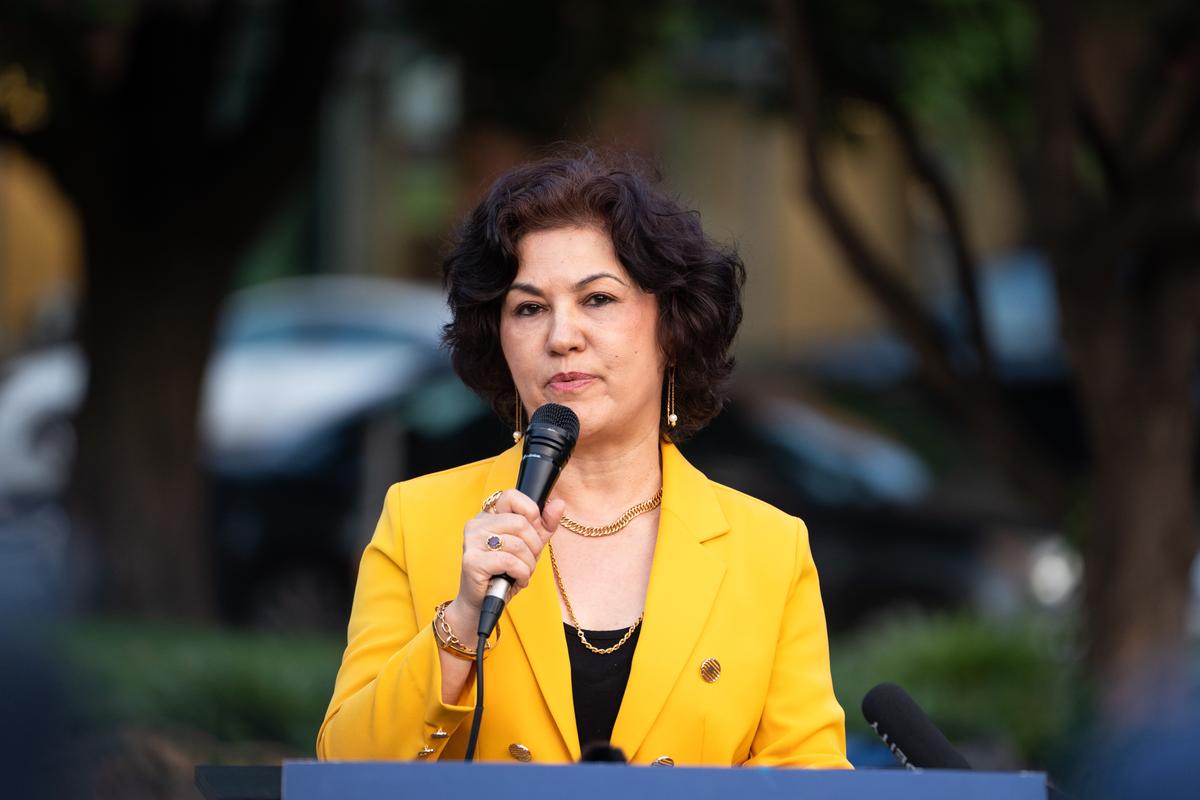The occasion serves as a chance to commemorate those killed in the “horrific” event, said Eric Patterson, president and CEO of the Victims of Communism Memorial Foundation, which hosted the vigil. But more than that, he said, it is a chance to note reasons for hope.
“We recall that in Romania, and Hungary, and Poland, and many other countries, the lies and lawlessness of communism did fall by the wayside,” he said, noting that what happened to these communist regimes makes him hopeful that “there will be a new day in China at some point in the future.”
Rushan Abbas, executive director of the Washington-based advocacy group Campaign for Uyghurs, said the 1989 incident showed what the Chinese regime “was capable of doing.”
“Today, depression flows through black cells in Tibet, the streets of Hong Kong, and the concentration camps in Xinjiang,” Abbas said at the vigil.
“China’s long black arm even reaches us here in the land of the free and the home of the brave through threats and transnational repression that crosses borders.
“The CCP’s methods change, the targets shift, but the goal stays the same: obedience without truth, silence without peace, prosecution without accountability. While the CCP quietly works to replace freedom and democracy with authoritarian rule, the world has been trained to treat its abuses as background noise.”

‘Outlive the CCP’
Rowena He, historian and author of the book “Tiananmen Exiles: Voices of the Struggle for Democracy in China,” was a student in China’s southeastern city of Guangzhou at the time of the massacre. She said she returned to her campus the next day wearing a black armband in mourning, and was told by the teacher that if she did not take it off, “no one” would protect her.Remembering what happened in 1989 matters to more than just the victims and participants in the protests, He told The Epoch Times.

“The truth is still not revealed, and justice is not done,” she said.
The regime deployed a cover-up around the Tiananmen Square incident, and something similar happened again during the COVID-19 pandemic, when medical doctors wanted to warn about the virus’s danger, He said in her speech.
“[It] became the violation of human rights of every single human being on Earth,” she said. “So don’t tell me that human rights and Tiananmen [are] about them, about China. It’s about here. It’s about us. It’s about now.”
Piero Tozzi, staff director of the bipartisan Congressional-Executive Commission on China, said the massacre offers a lesson about what the world could have done.
“The nature of the regime revealed itself 36 years ago—that’s the same regime that is in power today,” Tozzi told The Epoch Times. “The difference, though, is that they’re far more powerful, economically, militarily.”
In 2000, Congress passed legislation to give China permanent most favored nation status, now known as permanent normal trade relations, which paved the way for China’s accession to the World Trade Organization. The status opened the U.S. market to Chinese products with trade advantages, including reduced tariffs.
“There was a chance to really break the regime, but we bailed them out,” Tozzi said. “That monster has grown.

“Right now, it is an existential threat, not just to the United States but to the world.”
Frances Hui, who was granted U.S. asylum in September 2021, said she bought into the CCP’s propaganda about “the national pride of China” before finding out about the massacre when she was 10 years old.
Learning about the event opened her eyes, Hui told The Epoch Times.
“I realized, wow, like in China, actually that many years ago, people longed for a democratic China, and just like us, like Hongkongers, we’re fighting for it, all this time,” she said.
Hui is now the advocacy coordinator for the Committee for Freedom in Hong Kong Foundation.
Hongkongers tried to remember Tiananmen Square through vigils, and now that they are banned, others in the free world need to “carry on that responsibility, to keep remembering this day,” Hui said.
“Because as long as we remember it, one day justice will come, although it’s obviously a delayed justice,” she told The Epoch Times.
David Yu, board chairman of the June 4th Massacre Memorial Association, noted that although the Chinese regime may seem powerful, it currently faces many internal problems that are “irreconcilable.”

“They are being suppressed, and you don’t see them,” he told The Epoch Times. It is only a matter of time before these issues explode, he said, and “the day when they explode isn’t that far away.”
Yu ended his speech by expressing confidence in the CCP’s eventual collapse, and Hui echoed him, saying she believes that she will “outlive the CCP.”
“There’s no forever for any governance, and I believe that authoritarians will only lead to one end, which is the end of them,” Hui said. “So we need to prepare for it.”








